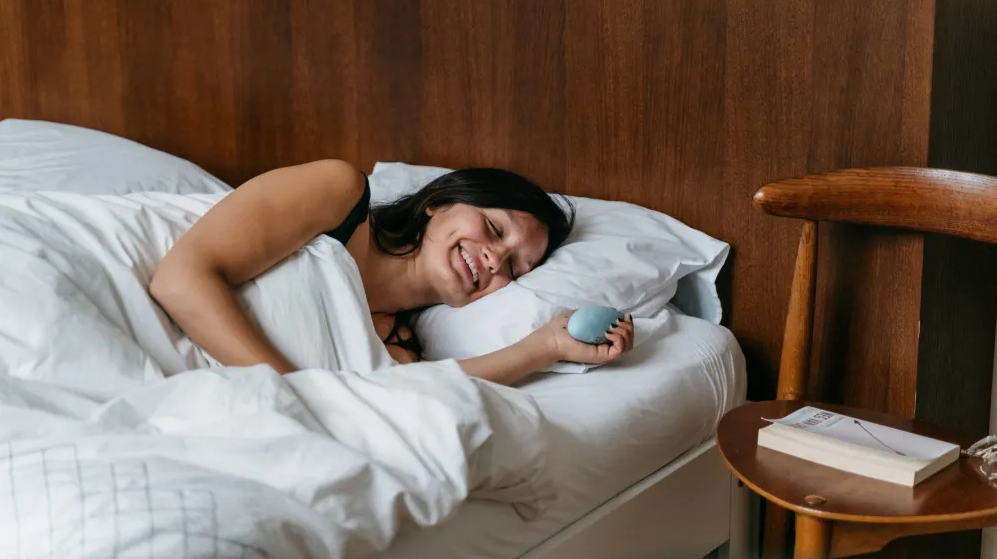
Warum langsames Atmen die Lösung für schlechte Schläfer ist
|
|
Lesezeit 3 min
Your cart is empty
Try moonbird for 30 days.
We are convinced you will love it.
Happy breathing!

You might also like

|
|
Lesezeit 3 min
20 bis 30% aller Erwachsenen leiden unter Schlafproblemen. Fast die Hälfte von ihnen hat so große Schlafprobleme, dass sie im Alltag nicht mehr richtig funktionieren können. Wir denken oft, dass Tabletten die Lösung sein können, ignorieren jedoch die Hauptursache: Stress und Angst. Wie kann unsere Atmung eine Lösung bieten?
Der Weltschlaftag findet jedes Jahr im März statt, dieses Jahr am Freitag, den 18ten. Ein Tag, der sich ganz auf das konzentriert, was wir alle so dringend brauchen, aber viele nicht bekommen. Warum schlafen wir so schlecht? Und was können wir dagegen tun?
Schlechter Schlaf ist ein weltweites Problem. Etwa 20% der Bevölkerung leiden unter Schlafproblemen und fast 30% schlafen sogar weniger als sechs Stunden pro Nacht, ein Zeichen für schlechte Schlafqualität.
Schlaflosigkeit wird oft als „einfach so“ abgetan, aber sie verdient definitiv echte Aufmerksamkeit. Claudine Drees, Schlafexpertin für kognitive Verhaltenstherapie bei Schlaflosigkeit (CGTI) bei sleepcompass.be, unterstreicht dies ebenfalls: „Schlaflosigkeit bedeutet, dass Sie Schwierigkeiten beim Ein- oder Durchschlafen haben oder dass Sie zu früh aufwachen. Schlaflosigkeit geht oft mit Sorgen, Unsicherheiten und dem Druck einher, den man im Leben erfahren kann. Dies führt dazu, dass man stundenlang wach liegt oder sich Sorgen macht. Oft macht man sich auch Sorgen, nicht schlafen zu können, was einen Teufelskreis erzeugt – denn je mehr man sich Sorgen macht, desto weniger wird man schlafen. Ihr seht, es ist ein anhaltendes Problem.“
Wenn Sie nicht gut schlafen, geht das auf Kosten Ihrer Produktivität und Leistungsfähigkeit während des Tages, was häufig zu mehr Stress führt. Dies bringt nicht zu unterschätzende Gesundheitsrisiken mit sich, darunter Stress, Depressionen und Diabetes.
Bei Schlafstörungen greifen viele Menschen schnell zu Tabletten. Doch das ist alles andere als optimal, denn die Qualität unseres Schlafes verbessert sich dadurch nicht. Der Ruf nach natürlichen Alternativen wird immer lauter – von Ärzten und Psychologen ebenso wie von Menschen mit Schlafproblemen selbst.
Seit 2012 bezeichnet die American Association for Sleep Medicine (AASM), die weltweite Referenz für Schlafexpertise, die kognitive Verhaltenstherapie (CGTI) als die am besten geeignete Therapie zur Lösung langfristiger Schlafprobleme. Die Erfolgsrate liegt laut klinischen Studien bei rund 80%. In kürzlich aktualisierten Richtlinien empfiehlt die AASM auch Atemübungen als wirksame Methode zur Behandlung chronischer Schlaflosigkeit bei Erwachsenen.
Drees: „Atemtechniken sind wirksam, um einen Zustand der Entspannung, eine niedrigere Herzfrequenz und Alpha-Gehirnwellen zu erreichen. Bei Alpha-Gehirnwellen verspüren Sie keinen Druck oder Stress (das sind Beta-Gehirnwellen) und können sich allmählich zu Theta- und Deltawellen entwickeln: Sie schlafen!“
Vor dem Schlafengehen langsam zu atmen ist Gold wert. Aber wie funktioniert das effektiv? Und wie hält man es jeden Tag durch? Als Moonbirds Mitbegründerin Stefanie Broes (PhD in Pharmaziewissenschaften) sah, dass immer mehr Menschen in ihrem Umfeld mit Schlafproblemen zu kämpfen hatten, wollte sie eine Lösung finden.
Stefanie: „Die Wissenschaft hat bereits bewiesen, dass langsame Atemübungen den entscheidenden Unterschied machen, wenn man gut schlafen möchte. Mir ist aufgefallen, dass viele Menschen in meinem Umfeld offen für Atemübungen sind, es aber schwer finden, diese langfristig durchzuziehen.
Wenn man alleine und ohne Anleitung atmet, stellt sich oft die Frage, ob man die Übungen auch richtig macht. Auch die tägliche Erinnerung ans Üben fehlt. Unser Gedanke war: Wenn wir dafür etwas entwickeln könnten, etwas Taktiles, das man in der Hand halten kann, das einen auf einfache Weise anleitet und einem auch Rückmeldung über die Wirkung gibt, dann können wir dieses Problem lösen.“
Aus diesem Grund wurde Moonbird entwickelt, ein praktisches Tool, das in Ihre Handfläche passt und Sie bei langsamen Atemübungen anleitet. Eine Studie über die Auswirkungen der Atmung mit Moonbird auf den Schlaf wird derzeit abgeschlossen. Die Ergebnisse sehen sehr vielversprechend aus und werden bald veröffentlicht. Bleiben Sie dran.
Welche Tipps kann Stefanie für einen besseren Schlaf geben?
„Untersuchungen zeigen, dass Sie 15 Minuten früher als gewöhnlich einschlafen und nachts nur halb so oft aufwachen, wenn Sie vor dem Schlafengehen 20 Minuten lang langsam atmen. Wenn Sie langsamer atmen, aktivieren Sie die natürliche Entspannungsreaktion Ihres Körpers, die Sie entspannen lässt. Darüber hinaus können Sie durch bewusst langsameres Atmen den Teufelskreis beunruhigender Gedanken durchbrechen, was Ihren Geist ebenfalls beruhigt.“
„‚Wie langsam ist langsam?‘, fragen Sie sich vielleicht. Untersuchungen zeigen, dass die oben genannten Effekte bei etwa sechs Atemzügen pro Minute auftreten (fünf bis sieben Atemzüge pro Minute, um genau zu sein). Das ist viel langsamer, als wir es gewohnt sind; im Durchschnitt atmet man im Ruhezustand etwa zwölf bis zwanzig Mal pro Minute.“
„Es ist eine Tatsache, dass langsame Atemübungen funktionieren. Sie haben jedoch die größte Wirkung, wenn Sie sie richtig und regelmäßig durchführen. Deshalb haben wir mit moonbird ein Tool entwickelt, das Sie auf intuitive Weise unterstützt und anleitet, wie ein Atemtrainer in Ihrer Hand.“
Atmen Sie langsamer. Es mag einfach klingen, aber oft liegt die wahre Stärke in der Einfachheit. Langsames Atmen ist der effektivste Weg, um besser zu schlafen. Ihr Atem ist in der Tat die Fernbedienung Ihres Nervensystems. Mit ein wenig Übung können Sie schnell und einfach die Kanäle wechseln. Von einem spannenden Abenteuerfilm zu einem wunderschönen Traumland ...
PS: Folgen Sie uns auf Instagram, um die neuesten Updates zu erhalten.
Your cart is empty
Try moonbird for 30 days.
We are convinced you will love it.
Happy breathing!

You might also like